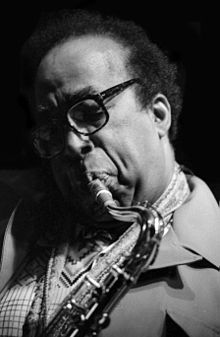Big Nick Nicholas, a tenor saxophonist, was active for over 50 years and never received any consistent recognition or rewards. His most prominent achievements include being the caloric soloist that improvised 16 bars on Dizzy’s 1947 recording “Manteca”, as well as being the recipient of a warmly whimsical portrait by John Coltrane and Duke Ellington in 1962. He also enjoyed a brief return to prominence during the 1980s. George Walker Nicholas was born August 2, 1922 in Lansing MI. He studied clarinet and saxophone during the years 1933-1939. He was strong and big-boned at ten years old. Young George was a skilled musician who practiced blowing his trumpet out of doors and playing the same song in multiple key signatures. This is a trait that was inherited from jazz masters and in tune with modern jazz’s direction. His father, a saxophonist and mentor, encouraged his son to play in various bands throughout the Detroit area in 1939-1940. He performed with Thad Jones and Hank Jones in a band while he was a teenager, hailing from Pontiac. He performed with Kelly Martin in Detroit’s Club Congo in 1942. Coleman Hawkins was Nick’s main influence. By the time Nick moved to New York, he was a permanent tenor sax player. He was a regular participant in the after-hours blowing sessions at Minton’s Playhouse on West 118th Street. In 1942, he worked for Earl “Fatha” Hines and in 1943, he gigged for half a full year with Tiny Bradshaw. After the Second World War ended, Nick began his busiest time. He studied music theory and harmony at Boston Conservatory, from 1944-1946. He appeared at the Savoy in Boston along with Sabby Lewis, who was soon to be the city’s first African American radio DJ), and recorded with Sarah Vaughan. Lucky Millinder’s Decca album “The Spider and the Fly” featured Nick. His tenor anchored a band that was led by J.C. Heard and supported comedian Dusty Fletcher’s famous recording of “Open the Door Richard”. Three days later, he recorded with Fats Navarro u0026 Miles Davis in a big band of 15 members led by Illinois Jacquet. Nick started collaborating with Hot Lips Page, a singing trumpeter. They would continue their collaboration until Page’s passing in 1954. Nicholas also joined the Dizzy-Gillespie orchestra in 1947 and was featured on “Manteca” and “Ool-ya-koo.” John Coltrane saw Nicholas with Gillespie at this time and was greatly impressed by what he heard. Nick performed in Paris, France with Gillespie’s bigband during a three month European tour. He recorded with pianist Una Mae Carlisle in 1950 and started leading jam sessions at Harlem’s Paradise Club. There he was known for his “joyous, boomy” voice. Big Nick and Eddie “Lockjaw,” Davis, of the Miles Davis Sextet (a pioneering unit that included Charles Mingus, Art Blakey, and Billy Taylor) locked horns on September 29, 1951 at Birdland. Blakey, Nick and Lockjaw recorded the “Tenor Sax Shuffle”, along with five other titles, in the studio a few days later. Nick was a backing vocalist for Jonah Jones in 1953. In 1955, he recorded Jazz Spectacular with Buck Clayton and Frankie Laine, performing memorable solos on “Baby Baby All the Time”, and “Sposin'”. Big Nick lived in Queens on 139th Street during the late ’50s. He played at the Club Harlem in Atlantic City and performed solo with the Shorty Alle band at Elegante, Brooklyn. Coltrane used the soprano to imitate the voice of Duke Ellington when he recorded “Big Nick” in 1962 with him. Although Trane’s tribute to Nick brought attention to him, his career was largely in jeopardy for the remainder of the decade. He was a part of a 1964 benefit for Pee Wee Russell. Unfortunately, Big Nick suffered from the same alcoholism as the clarinetist in 1969. He lived in Charlottesville, VA during the 1970s, and was a teacher there. In 1979, he also held a regular booking at a country bar lounge. After this, he was engaged in New York and went on a European tour in 1980 with John Hicks and Walter Booker. He made a brief return in 1984 to release his first album. This allowed him to preserve his eccentric singing style and disarming rendition of “Corrine Corrina.” Big Nick followed Big and Warm in 1985. These India Navigation albums have not received the attention they merit. George Walker Nicholas, Queens, NY, died on October 19, 1997.
